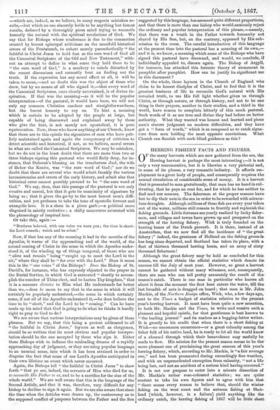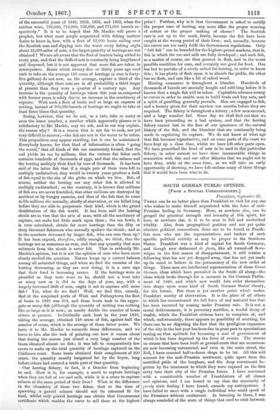HERRING FISHERY FACTS AND FIGURES.
OF the many harvests which are now gathered from the sea, the Herring harvest is perhaps the most interesting ;—it is not only a very remunerative, but it is likewise a very pictorial and, in some of its phases, a very romantic industry. It affords em- ployment to a great body of people, and consequently requires the annual circulation of considerable sums of money. It is a harvest. that is presented to man gratuitously, that man has no hand in cul- tivating, that he pays no rent for, and for which he has neither to. find seed nor manure. The fishermen at the proper seasons have but to dip their nets in the sea in order to be rewarded with miracu- lous draughts. Although millions of these fish are every year taken. out of the water, millions still remain to fructify and replenish the fishing grounds. Little fortunes are yearly resilind by lucky fisher- men, and villages and towns have grown up and prospered on the strength of the herring fishery. Wick is truly founded on the herring bones of the Dutch proverb. It is there, instead of at. Amsterdam, that we now find all the incidence of "the great. fishery ;" indeed, the greatness of Holland on the fishing grounds. has long since departed, and Scotland has taken its place, with a- fleet of thirteen -thousand herring boats, and an army of sixty thousand fishermen
Although the great fishery may be held as concluded for this, season, we cannot obtain the official statistics which denote itte success till the July of next year. However, so great a harvest. cannot be gathered without many witnesses, and, consequently, there are men who can tell pretty accurately the result of the season's catch. There is one man in particular who knows all about it from the moment the first boat enters the water, till the last breadth of nets is dragged on board ; that man is Mr. John, Mackie, of the Northern Ensign office, Wick, who, a few days ago, sent to the Times a budget of statistics relative to the present. year's herring harvest. It must have been quite a new sensation,. to both Mr. Mackie and the Times, to write and receive such a. pleasant and hopeful epistle, for that gentleman is best known to "the leading journal" and its readers as a begging-letter writer.. It is greatly to his credit that when there is a short fishing at Wick—no uncommon occurrence—or a great calamity among the fisher folk of his native land, he is ready to let all the world know of a channel through which their benevolence may usefully be made to flow. His mission for the present season seems to be the more pleasant one of proclaiming the great success of this years herring fishery, which, according to Mr. Mackie, is "a fair average- one," and has been prosecuted during exceedingly fine weather, and with an unprecedented exemption from calamity, "not a life being lost, and not an accident of a serious kind having occurred."
It is not our purpose to enter into a minute dissection of Mr. Mackie's rather rose-coloured statistics ; we are quite content to take his own figures and to agree with him that- " there seems every reason to believe that, should the winter fishing on the west coast and the autumn fishing at Shet- land [which, however, is a failure] yield anything like the ordinary catch, the herring fishing of 1867 will be little short. of the successful years of 1849, 1853, 1855, and 1862, when the catches were, 770,000, 710,000, 766,000, and 771,000 barrels re- spectively." It is to be hoped that Mr. Mackie will prove a prophet, but what most people acquainted with fishing matters desire to know is, how, with a fleet of 13,000 boats sailing over the Scottish seas and dipping into the water every fishing night about 13,000 miles of nets, a far larger quantity of herrings are not obtained ? We are all aware that the fleet of boats is being added to every year, and that the drift of nets is constantly being lengthened and deepened, but it is not apparent that more fish are taken in consequence. Boats which twenty-five or thirty years ago used each to take on the average 150 crans of herrings (a cran is forty- five gallons) do not now, on the average, capture a third of the quantity, although these nets are in all probability a third larger at present than they were a quarter of a century ago. Any increase in the quantity of herrings taken this year aa.compared with former years is solely due to an increase in the machinery of capture. With such a fleet of boats and so large an expanse of netting, instead of 700,000 barrels of herrings we ought to take at least three times that quantity.
Seeing, however, that we do not, as a rule, take so many as even the leaser number, a number which apparently pleases or is satisfactory to Mr. Mackie, may we ask, and in our way explain, the reason why? It is a reason that is not far to seek, nor yet very difficult to answer,—the fish are not in the water to be taken. This proposition may appear startling, but it can be maintained. Everybody knows, for that kind of information is often "going the round," that all kinds of fish are enormously fecund, that the cod yields its roe by millions, that the various flat fishes each contains hundreds of thousands of eggs, and that the salmon and the herring multiply their kind by tens of thousands. It has been said of the latter fish that if a single pair of them were left to multiply undisturbed, they would in twenty years produce a bulk of fish equal to the size of the globe on which we live. But, of course, neither the herring nor any other fish is allowed to multiply undisturbed ; on the contrary, it is known that millions of fish ova are never fructified, that other millions are destroyed by accident or by hungry enemies, and that of the fish that do come to life millions die annually, chiefly of starvation, or are killed long before they are able to perpetuate their kind, which is -the grand desideratum of the fish world. It has been said the herring shoals are so vast that the arts of man, with all the machinery of capture, can make but little mark upon them ; the sea fowls, it is even calculated, obtain far more herrings than the fifty or sixty thousand fishermen who annually spoliate the shoals ; and as to the numbers devoured by larger fish, who can sum them up? It has been argued, therefore, oddly enough, we think, that the herrings are as numerous as ever, and that any quantity that man subtracts from the shoals is never felt. That is evidently Mr. Mackie's opinion, but it is not the opinion of men who have more closely studied the question. Nature keeps up a correct balance among all animated things, and when we find the enemies of the herring decreasing, as they are now doing, it is a sure sign that their food is becoming scarce. If the herrings were as plentiful as they were wont to be, should not a boat take as many now as it did in the days of yore, nay, with a largely increased drift of nets, ought it not to capture still more fish ? Yet, what do we find? Well, we find this, namely, that at the conjoined ports of Wick and Pultenytown the fleet of boats in 1820 was 604, and these boats took in the aggre- gate as many fish (although the quantity of netting was nothing like so large as it is now), as nearly double the number of boats obtain at present. Individually each boat in the year 1820, taking the average, obtained 148 crans of fish, against half the number of crans, which is the average of these latter years. We leave it to Mr. Mackie to reconcile these differences, and we leave to him also the task of pointing out how it comes about that during the season just closed a very large number of the boats obtained almost no fish; it was left to comparatively few crews to make up the total quantity of herrings captured on the Caithness coast. Some boats obtained their complement of 200 crane, the quantity usually bargained for by the buyer, long before others had secured a tenth part of that quantity.
Our herring fishery, in fact, is a blunder from beginning to end. How is it, for example, a merit to capture herrings when they are full of roe and milt, while it is a crime to capture salmon at the same period of their lives? What is' the difference in the chemistry of these two fishes, that at the time of spawning a gravid salmon 'should not be esteemed fit for food, whilst only gravid herrings can obtain that Government Certificate which enables the curer to sell them at the highest price ? Further, why is it that Government is asked to certify the proper cure of herring, any more titan the proper weaving of cotton or the proper making of cheese? The Scottish cure is not up to the mark, firstly, because the fish have been caught at the wrong period of their lives ; and, secondly, because the curers can too easily fulfil the Government regulations. Only "full fish" can be branded for the highest-priced markets, that is, fish in which the roe and milt are fully developed ; and such fish, as a matter of course, are then poorest in flesh, and in the worst possible condition for cure, and certainly not good for food. One has but to partake of a nicely salted fat herring, in order to know this ; it has plenty of flesh upon it to absorb the pickle, the other has no flesh, and eats like a bit of salted wood.
Herring commerce is throughout a blunder. Hundreds of thousands of barrels are annually bought and sold long before it is known that a single fish will be taken. Capitalists advance money to curers in order to enable men to build boats and buy nets, and a spirit of gambling generally prevails. Men are engaged to fish, and a bounty given for their services ten months before they are required. The fishery is throughout a lottery ; a few men succeed, and a large number fail. Some day we shall find out that we have been proceeding on a bad system, and that the herring fishery cannot last in the face of our ignorance of the natural history of the fish, and the blunders that are continually being made in regulating its capture. We do not know at what age that fish becomes reproductive, and on some parts of the coast we have kept up a close time, whilst we have left other parts open. We have prescribed the kind of nets to be used in this particular fishery, in sober earnest we have done innumerable things in connection with this and our other fisheries that we ought not to have done, while at the same time, as we will take an early opportunity of showing, we have left undone many of those things that it would have been wise to do.































 Previous page
Previous page